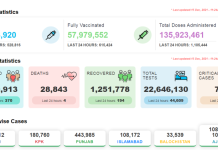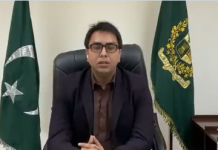Despite fundin
g shortage, the Higher Education Commission (HEC) has spent millions of rupees on non-educational events.
In April, the HEC organised the cultural event titled: ‘Payam-e-Subh’ for Afghan students who are pursuing higher education in various univers
ities of Pakistan. Their studies are being funded exclusively by the government of Pakistan through the HEC.
The commission spent over Rs 4 million, including on dinner/refreshment and transportation, sources said.
“A very handsome amount was also paid to singers who performed on the occasion,” sources said.
Prime Minster of Pakistan Imran Khan, who initiated an austerity drive for public sector department to save funds, is the controlling authority of the HEC.
When contacted, HEC said tha
t the event was held in connection with Allama Iqbal Scholarship Programme for Afghan students studying in various univers
ities of Pakistan.
The commission said tha
t the scholarships for Afghan students were launched in two phases: the first phase was launched in 2009 for 3,000 students and was executed by the Ministry of Inter-Provincial Coordination; and the second phase was launched in 2016 by the HEC.
The Phase-II was also for 3,000 students. In Phase-I, 2,912 scholarships were awarded agains
t the target of 3,000, while in Phase-II, 575 students were placed in Pakistani univers
ities in the first batch.
According to the HEC, the total cost of Phase-I of the
programme was Rs 6,705 million. A total of Rs 7,389 million were allocated for Phase-II.
An official said that it was very surprising that a large number of youth in the country were unable to get higher education due to a lack of resources. “However, the government is spending billions on foreign students who will prefer to serve in their own country after the education. Investing billions on such
programmes is quite illogical at a time when higher education sector is facing a crisis,” the official said, adding that such initiatives could only be supported by countries who were economically self-sufficient.
However, the HEC said tha
t the scholarship
programme was an important cultural and strategic exchange. “It helps build solidarity among the two nations. Foreign students also benefi
t the host country,” it added.
Earlier, HEC Chairman Dr Tariq Banuri had said tha
t the commission faced budgetary constraints. He had said tha
t the expected cut in the HEC budget in the coming annual budget would make matters worse.
According to Dr Banuri, the required higher education budget was estimated to
be Rs 103.5 billion for the 2019-2020 fiscal year. But according to the Indicative Budgetary Ceilings (IBC), the sector has been allocated a recurring grant of just Rs 58.5 billion for 2019-20.
When asked abou
t the expected outcome of the Allama Iqbal Scholarship Programme, the HEC did not provide any satisfactory answer. “It is a strategic
programme, wherein the government is committed to supporting its neighbourly Muslim country in infrastructure and human resources development. The
programme will create goodwill among Afghan people. The students will be ambassadors of Pakistan in Afghanistan once they return to their country,” HEC said.
The
programme had been started in 2009. Even after the passage of a decade, the commission is still saying tha
t the impact of the
programme will be witnessed in the coming days.
Educationists said tha
t the HEC had no statistical data to back its claims about the
programme.









